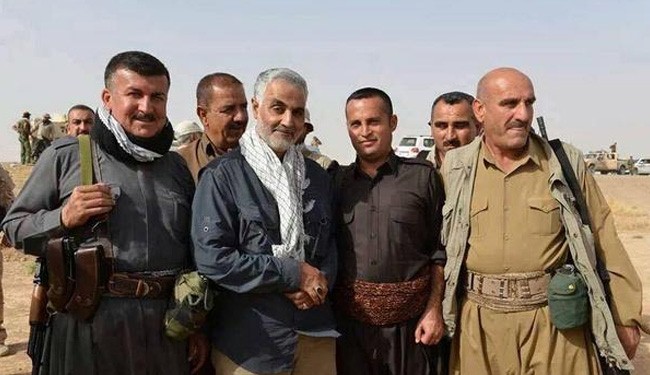December 12, 2014

The presence in Iraq of Brig. Gen. Qasem Soleimani, the head of Iran’s Qods Force, is a violation of UN sanctions—but by Iraq, not Soleimani.
The latest UN report on sanctions contains a news photo of Soleimani with Iraqi troops inside Iraq.
It notes that under UN sanctions, he has been subject to a ban on international travel and a freeze on his assets abroad approved by the UN Security Council in 2007.
Under the resolution, all UN member states are required to bar him from entering their territory.
Soleimani is known to have traveled to Iraq many times since 2007. The United States has often noted his presence in Iraq but has not made a public issue out of it. Soleimani has often met with senior Iraqi officials in Baghdad, so it is not a matter of his sneaking in and out of the country without the awareness of the Baghdad authorities.
The United Stats designated Soleimani’s Qods Force as a supporter of terrorism in 2007 and the EU did the same thing in 2011.
Meanwhile, Foreign Policy magazine reported Tuesday that the United States was concerned that Iran had been illicitly seeking parts for its nuclear complex at Arak.
Some Republicans picked this up and said it showed that Iran was violating its interim nuclear agreement with the United States.
Rep. Ed Royce of California, the chair of the House Foreign Affairs Committee, said, “The wheels seem to be coming off the Administration’s Iran strategy.” He said Tehran “is proving to be a determined cheaterÖ. There are now multiple reports that Iran has violated its commitments to freeze its nuclear program.”
Royce did not say where these “numerous reports” came from. The International Atomic Energy Agency (IAEA) assesses Iranian compliance and issues a monthly report. All have found Iran in full compliance,
The interim agreement limits what construction Iran can do at Arak, but says absolutely nothing about buying components for the plant as long as they aren’t installed there.
The United States and EU do have bans on exporting the kinds of equipment needed at Arak, so the sale of such equipment might violate those export bans, but they are different from Iran’s commitments under the interim agreement.
State Department spokeswoman Jen Psaki said Washington remains “concerned about Iran’s procurement activities,” but emphasized that “Iran has kept all of their commitments” under the November 2013 interim agreement.
The White House Fact Sheet on the interim agreement said about Arak, “Iran has committed to: not commission the Arak reactor; not fuel the Arak reactor; halt the production of fuel for the Arak reactor; no additional testing of fuel for the Arak reactor; not install any additional reactor components at Arak; not transfer fuel and heavy water to the reactor site.”






















